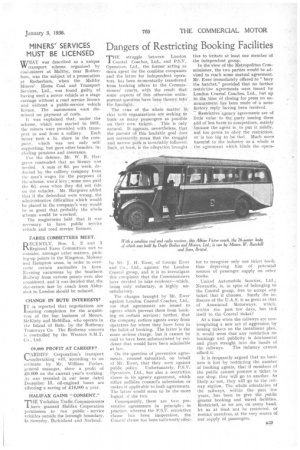Dangers of Restricting Booking Facilities
Page 49

If you've noticed an error in this article please click here to report it so we can fix it.
THE struggle between London
Coastal Coaches, Ltd., and P.S.V. Operators, Ltd., the former acting as main agent for the combine companies and the latter for independent operators, has been momentarily transferred from booking offices to the Commissioners' courts, with the result that sonic aspects of this otherwise unim
portant question have been thrown into
, the limelight, The crux of the whole matter that both organizations are seeking to book as many passengers as possible on their own tickets. This is only natural. It appears, nevertheless, that the pursuit of this laudable goal does not necessarily mean that the stra,ight and narrow path is invariably followed. Such, at least, is the allegation brought by Mr. J. H. Ewer, of George Ewer and Co., Ltd., against the London Coastal group,' and it is to investigate this complaint that the Commissioners have decided to take evidence—which, being only voluntary, is highly unsatisfac tory.
The charges brought by Mr. Ewer against London Coastal Coaches, Ltd., are that agreements are issued to agents which prevent them from booking on certain services ; further, that the company entices agents away from operators for whom they have been in the habit of booking. The latter is the more serious charge, but it cannot be said to have been substantiated by evidence that would have been admissible at law.
On the question of preventive agree-, me..nts, counsel s,ubmitted, on • behalf of Mr. Ewer, . that they were against public policy.. Unfortunately, P.S.V. Operators, Ltd., has also a restrictive clause in its agency agreement, which either nullifies counsel's submission or makes it applicable to both agreements.The latter would seem to be the more logical of the two.
Consequently, there are two preventive agreements in principle ;• inpractice., whereas the P.S.V. restrictive clause has been inoperative, the Coastal clause has been sufficiently effecS, tive to irritate at least one member of the independent group.
In the view of the Metropolitan Commissioner, the two parties would be advised to reach some mutual agreement. Mr. Ewer immediately offered to " bury the hatchet," provided that no further restrictive agreements were issued by London Coastal Coaches, Ltd., hut up to the time of closing for press..no announcement has been made of a satisfactory reply having been received.
Restrictive agency 'agreements are of little value to the party issuing them and of less harm to competitors, mainly because the agent is to put it mildly, not too prone to obey the restriction, or is too big to be tied. Much more harmful to the industry as a whole is the agreement which binds the opera tor to recognize only one ticket hook, thus depriving him of potential sources of passenger supply on other books.
United Automobile Services, Ltd., Newcastle, is, in spite of belonging to the Coastal group, free to accept any ticket that it chooses. Surely the influence of the U.A.S. is as great as that of Associated Motorways, which, within the past few days, has tied itself to the Coastal ticket?
At a time when the railways are contemplating a new act of aggression by issuing tickets on the instalment plan, it would seem that any restriction' On bookings and publicity is detrimental and plays straight into the hands of the railways. The industry cannot afford it.
It is frequently argued that no business is lost by restricting the number of booking agents, that-if members of the public cannot procure 'aticket in one shop, they will go to another. As likely as 'not, they will go' to 'the railway station. The whole orientation of the railways, Within thepast 'few years, has been to give the public greater booking and travel facilities. Restricted, as we are, on 'every hand, let us at least not be restricted, or restrict ourselves, at the very source of our supply df passengers.




















































































